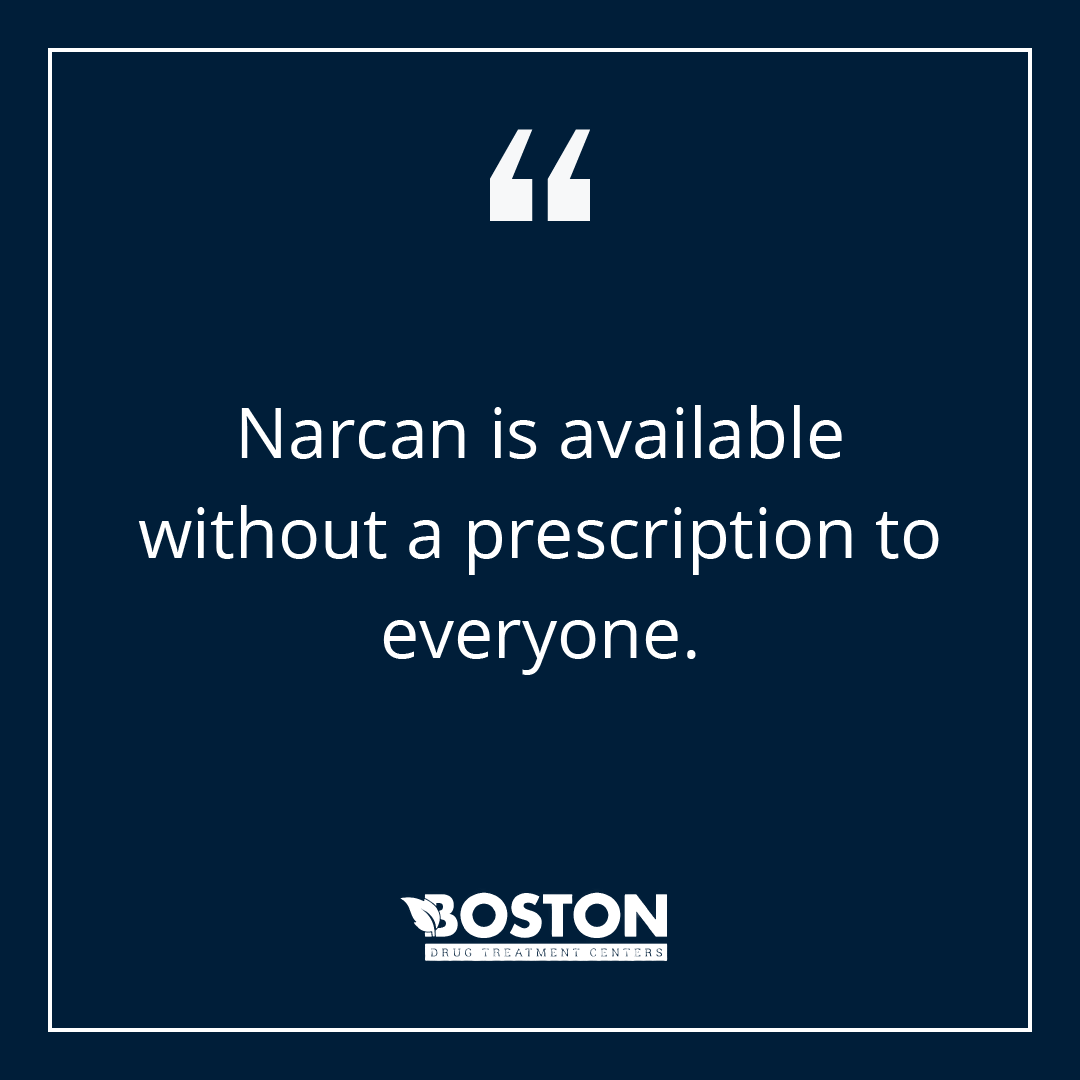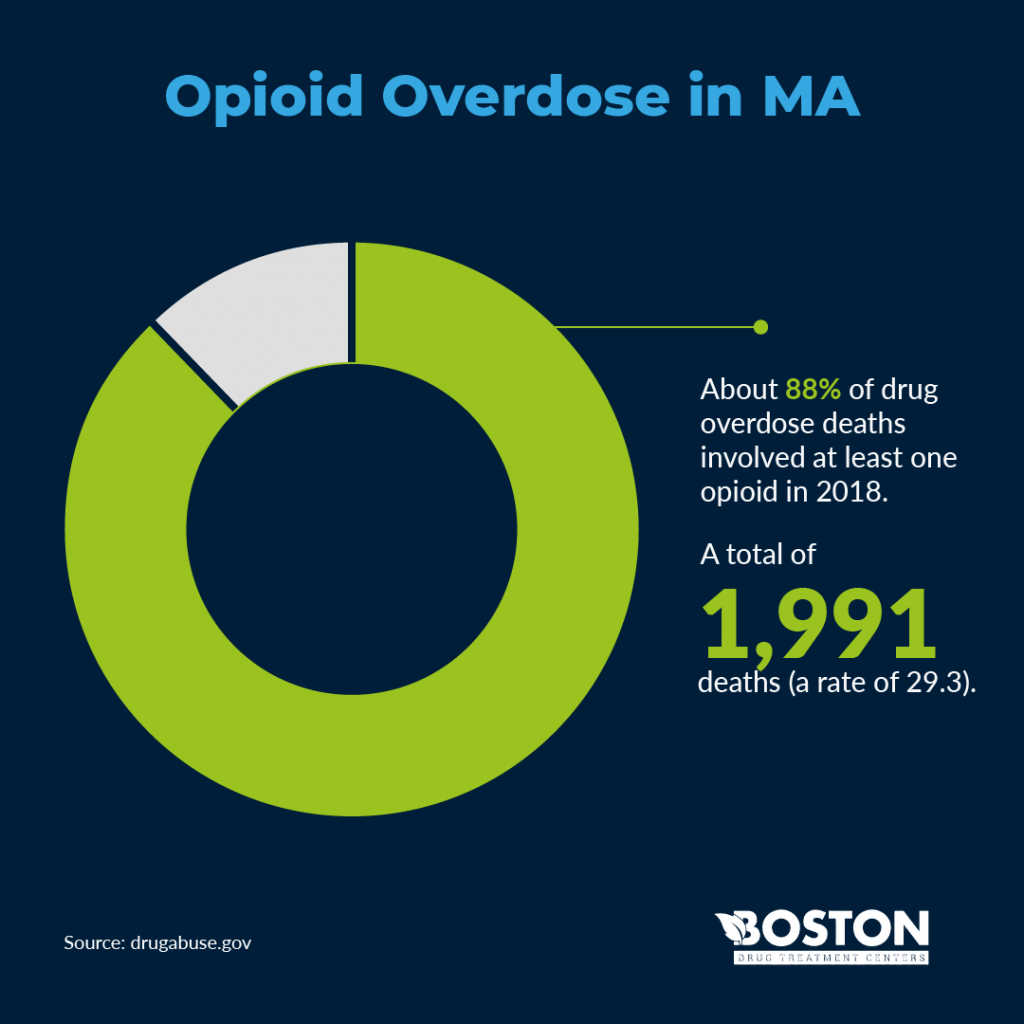
6 Harmful Myths About Detox
September 2, 2021
Fentanyl Test Strips: Preventing an Overdose
October 1, 2021Narcan is a life-saving medication that reverses the fatal effects of an opioid overdose. Naloxone comes in several forms, including Narcan, which is the nasal spray, and an injectable formulation. Narcan is available at most pharmacies in Massachusetts and through local organizations. MassHealth and some other insurance providers have worked to make Narcan more accessible, which is why many people are eligible for free Narcan in Massachusetts.
Narcan is available without a prescription to everyone, no matter what kind of health insurance you do or do not have. If you cannot get it for free, the cost for a two-dose kit usually ranges between $30 to $50.
Does Insurance Cover Narcan?
In Massachusetts, most insurance providers cover the cost of Narcan. MassHealth, the Medicaid insurance provider in Massachusetts covers Narcan free of charge from a pharmacy. Check with your insurance provider to see if Narcan is covered and what your co-pay would be if it isn’t free.
How Much Does Narcan Cost Without Insurance?
According to the Massachusetts Substance Use Helpline, without insurance, a two-dose Narcan kit will cost between $30 and $50 at a pharmacy in Massachusetts.1
Which Pharmacies Sell Narcan in Massachusetts?
Every Walgreens and CVS pharmacy in Massachusetts has a “Narcan standing order.” That means they should always have Narcan available to anyone who asks for it. Many other pharmacies in Massachusetts have the same policy. Call ahead to make sure they have it available before you head to the pharmacy.

How to Get Narcan from a Pharmacy
Narcan is available from most pharmacies in Massachusetts. You can get a prescription from your doctor and the pharmacy will fill it and bill your insurance like any other prescription. You can also go directly to a pharmacy and request a naloxone kit without a prescription.
There are a few naloxone varieties available, so be sure to let them know which type you prefer. Narcan, the nasal spray, is much easier to use and is designed for people without medical training to administer.
Programs that Offer Free Narcan in Massachusetts
In addition to pharmacies, there are organizations across Massachusetts that have free Narcan programs.
Massachusetts Department of Public Health
The Massachusetts Department of Public Health currently has an Overdose Education and Naloxone Distribution program. This program offers training to individuals who are likely to witness or experience an opioid overdose on how to use Narcan and other types of naloxone.2
The training covers:2
- How to prevent and recognize an opioid overdose
- What to do if an overdose happens
- Why it is necessary and critical to call 911
- How to perform rescue breathing
- How to administer naloxone (Narcan)
You must complete the training before you can receive a naloxone kit.
Boston Public Health Commission
If you live near Boston, there is an Overdose Prevention training program available from the Boston Public Health Commission. It covers the same steps as the program offered by the Massachusetts Department of Public Health. Participants receive a Narcan rescue kit when they have completed the training.3
How Can Narcan Save a Life?
When a person has taken too much of a drug for the body to handle, an overdose occurs. Unfortunately, opioid overdoses are fairly common in Massachusetts. In fact, approximately 88% of drug overdose deaths in Massachusetts in 2018 involved at least one opioid.4
Drug overdoses are also one of the leading causes of death in Massachusetts. The Centers for Disease Control (CDC) reported 2,168 deaths by drug overdose in Massachusetts in 2017. This is the sixth-highest leading cause of death in the state.5
Narcan and other types of naloxone are opioid antagonists. They block the receptors that the opioid drug attaches to and reverse the effects of an overdose. Narcan acts quickly and can help restore normal breathing within minutes to potentially save a person’s life.

Opioid Overdose Symptoms
If you suspect a person has overdosed on an opioid drug, you should look for some of the following symptoms:6
- Slow, shallow breathing, or no breathing at all
- Unresponsive to your touch or voice
- Gurgling or other irregular sounds coming from the person
- Blue, gray, or purple lips and tips of fingers
An opioid overdose is a life-threatening emergency. That is why it is so important to act quickly and call 911 if you think someone has overdosed. Besides saving someone’s life, calling 911 can also connect someone with the opioid addiction treatment they need. Once stabilized at the hospital, the hospital can refer the person to a Boston drug rehab treatment center.
Using Narcan
Narcan and other forms of naloxone are designed to be easy to administer. There are four types of naloxone available: a multi-step nasal spray, single-step nasal spray, auto-injector, and intramuscular injection.
We are going to focus on the two most common types of naloxone, the single-step nasal spray, and the intramuscular injection.
For the single-step nasal spray, which is usually sold under the brand name Narcan, do the following:
- Open the package: Peel open the back of the package to remove the Narcan injector. Place your thumb on the red plunger and one finger on either side of the nozzle.
- Place the device: Put the tip of the nozzle inside the nostril of the patient. Push it in until your fingers touch the patient’s nose.
- Press the plunger: Press firmly on the red plunger to release the full dose into the patient’s nostril.
If you are using the intramuscular injection, following these steps:
- Remove the cap: Take the cap off the vial and stick a needle through the rubber stopper.
- Fill the needle: Flip the vial and needle upside down and pull back on the plunger to fill the needle. Make sure it is filling with liquid and not air.
- Inject the needle: Inject the needle directly into the patient’s muscle. Either the shoulder muscle or the front of the thigh is a suitable place. Push down on the plunger until the syringe is empty. It is okay to give the injection through clothing.
What To Do After Giving Narcan
No matter which type of naloxone you administer, it is important to stay with the patient. If they do not respond to the Narcan within 3-5 minutes, you should give them another dose. Call 911 and use rescue breathing if you can while you wait for emergency help.
The effects of Narcan only last for about 30-90 minutes. Most opioids will have effects that last longer than that, so once the naloxone wears off, it’s possible the person may return to overdosing. If that happens, you may need to administer Narcan again if medical help has not yet arrived.
Massachusetts’ Good Samaritan Law protects those calling 911 during an overdose from getting charged with possession of a controlled substance. This law encourages more people to call 911 during an overdose and increases the likelihood that a life will be saved.7
After you have called 911, stay with the person who has overdosed. Make sure to turn them on their side so they won’t choke if they vomit. When the paramedics arrive, let them know that you gave the person Narcan or another form of naloxone and when you administered it.
Interested in learning about your rehab options? Call 1-800-429-7690 to find an addiction treatment program that’s right for you or someone you love.
Resources
- The Massachusetts Substance Use Helpline (n.d.) Naloxone /overdose prevention.
- Massachusetts Department of Public Health. (2017, March) Overdose Education and Naloxone Distribution.
- Boston Public Health Commission. (n.d) Overdose Prevention and Naloxone Training.
- National Institute of Health (2020, April 3) Massachusetts: Opioid- Involved Deaths and Related Harms.
- Center for Disease Control and Prevention. (2018, April 11) National Health Center for Health Statistics: Stats of the State of Massachusetts.
- S. National Library of Medicine. (2021). Opioid Overdose.
- Overdose Prevention and Education Network (OPEN). (2021) The Good Samaritan Law.

